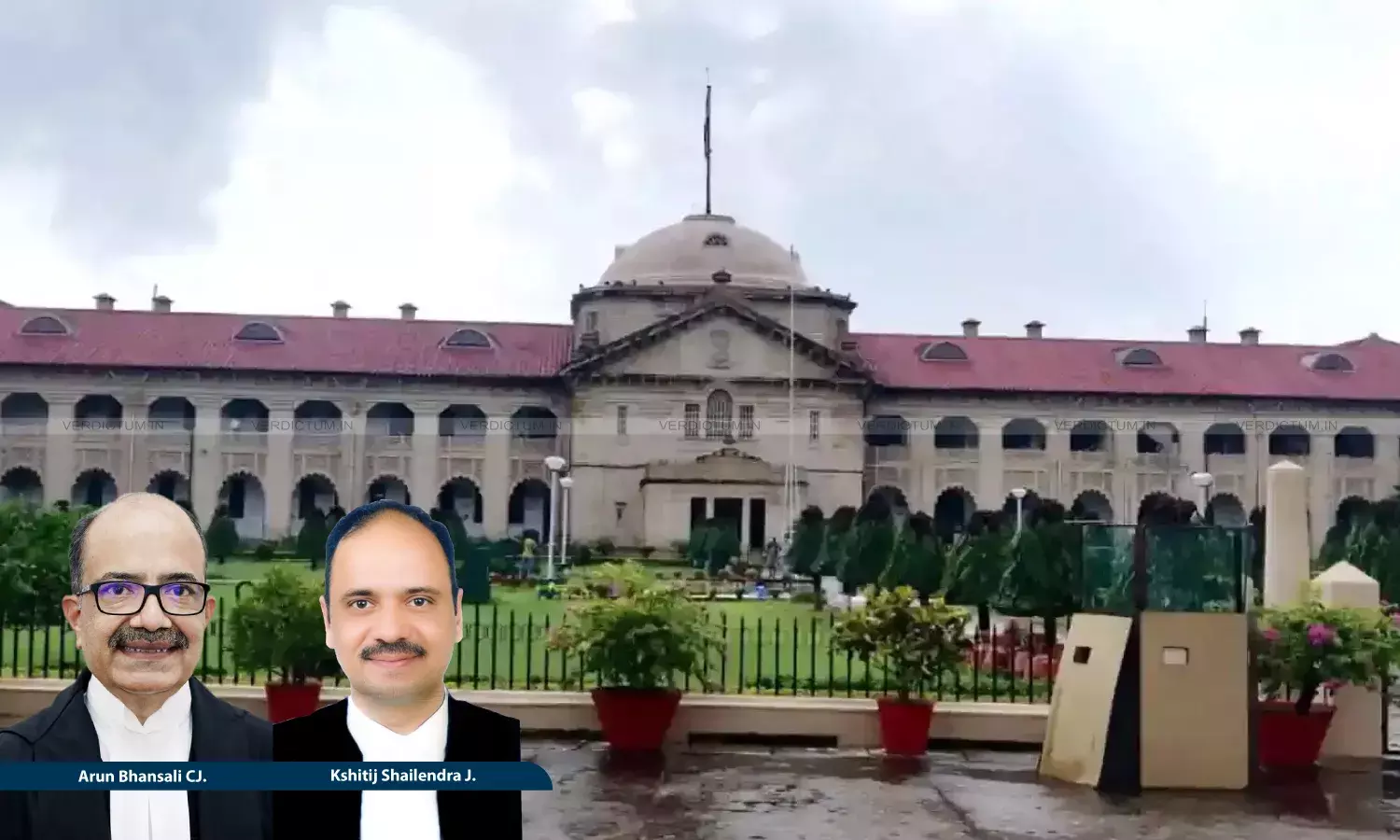Conviction Of Juvenile Shall Not Result In Service Disqualification; But It Is Subject To Exceptions U/S. 19 Juvenile Justice Act: Allahabad High Court
The High Court held that once a person is declared a juvenile for the date of the alleged offence, conviction does not cause disqualification from service, and the only exception is the situation contemplated under Section 19(1)(i) of the Juvenile Justice Act, 2015.

Chief Justice Arun Bhansali, Justice Kshitij Shailendra, Allahabad High Court
The Allahabad High Court has held that the conviction of a juvenile does not result in any service-related disqualification under the Juvenile Justice Act.
The High Court clarified that such protection continues unless the case falls within the specific exception created under Section 19(1)(i) of the Juvenile Justice Act, 2015, which applies only when a child above 16 years of age is found to be in conflict with law.
The Court was hearing two writ petitions, one filed by a selected candidate for the post of PGT (Mathematics), whose services had been terminated on the allegation of concealment of criminal proceedings that arose long before his appointment. The other petition was filed by the employer challenging the order of the Tribunal.
The petitioner had challenged an order of the Central Administrative Tribunal which, after setting aside his termination, had remanded the matter for reconsideration.
A Bench comprising Chief Justice Arun Bhansali and Justice Kshitij Shailendra, while deciding the matter, held: “We are making these observations in the light of Section 24 of the Act of 2015, which is identical to Section 19 of the Act of 2000 providing that even conviction of a juvenile shall not suffer disqualification qua his services, however, there is an addition in the new Act in terms of proviso to sub-section (1) of Section 24 wherein a child who has completed or is above the age of 16 years and is found to be ‘in conflict with law’ by the Children’s Court under Section 19(1)(i) of the new Act, the protection granted under sub-section (1) of Section 24 would not be available to him.”
Advocate Devesh Kumar Sharma represented the petitioner, while ASGI Anant Kumar Tiwari appeared on behalf of the respondents.
Background
The petitioner was selected as PGT (Mathematics) and joined the service. Later, based on a complaint alleging that he had concealed information about a past criminal case, his services were terminated.
Before the Tribunal, the petitioner placed reliance on an order of the Juvenile Justice Board declaring that he was a juvenile on the date of the alleged offence. The Tribunal quashed the termination, holding that concealment could not be presumed to be deliberate, but remanded the matter to the appointing authority for a fresh decision.
Aggrieved, the petitioner challenged the remand before the Allahabad High Court and sought reinstatement, while the employer defended the order of reconsideration.
Court’s Observation
The Allahabad High Court examined Section 24 of the Juvenile Justice Act, 2015, alongside Section 19 of the Juvenile Justice Act, 2000, and held that both provisions protect a juvenile from suffering disqualification as a result of conviction. The Bench, however, noted that the 2015 Act contains a proviso that removes this protection only in a specific situation.
The Court stated that the proviso applies only where a child above 16 years of age is found to be in conflict with law by the Children’s Court under Section 19(1)(i) of the 2015 Act. The Bench held that no such situation existed in the present matter.
The Bench further observed that although the petitioner was declared a juvenile in 2024 under the Juvenile Justice Act, 2015, the legal position had to be assessed with reference to the law in force at the time of the alleged incident in 2011.
Subsequently, the Court noted that “while examining the effect of juvenility of the present petitioner on his services, we find that since the FIR in question was lodged against him in the year 2011 and the relevant date of the alleged commission of offence by him, i.e. 18.04.2011, is prior to coming into force of Act of 2015, no provision of the new Act would come in his way”.
The Court further held that once the Tribunal had set aside the termination order, it ought to have directed full reinstatement rather than remanding the matter. The High Court accordingly modified the Tribunal’s order.
Conclusion
The writ petition filed by the PGT (Mathematics) candidate was allowed. The Court directed reinstatement with all consequential financial and service benefits, to be completed within one month of receipt of the order. The writ petition filed by the employer was dismissed.
Cause Title: Navodaya Vidhyalaya Samiti & Others v. Pundarikaksh Dev Pathak & Another (Neutral Citation: 2025:AHC:187064-DB)
Appearances
Petitioners: Advocates Devesh Kumar Sharma, Pankaj Kumar Gupta
Respondents: ASGI Anant Kumar Tiwari


